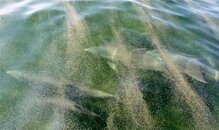So you think the MMS is going to investigate this correctly? You need to read this:
Robert F. Kennedy Jr.: Sex, Lies and Oil Spills
Yes, it's written by a democratic and it's heavily slanted. But if what RFK, Jr. says about the MMS is true, this is all going to be covered up. BTW, I'm curious about what he wrote about how they were drilling below the depth listed in the permit and how they managed to get away with that.
Just my 2 cents.
Trish
An article on the MMS
Oil projects get a free pass
The U.S. Interior Department has waived environmental studies for oil exploration plans since the spill in the Gulf.
Related Content
'Dome' placed over well in a step to contain leak BY MARISA TAYLOR
McClatchy News Service
WASHINGTON -- Since the Deepwater Horizon oil drilling rig exploded April 20, the Obama administration has granted oil and gas companies at least 27 exemptions from doing in-depth environmental studies of oil exploration and production in the Gulf of Mexico.
The waivers were granted despite President Barack Obama's vow that his administration would launch a ``relentless response effort'' to stop the leak and prevent more damage to the Gulf. One of them was dated Friday -- the day after Interior Secretary Ken Salazar said he was temporarily halting offshore drilling.
The exemptions, known as ``categorical exclusions,'' were granted by the Interior Department's Minerals Management Service, or MMS, and included waiving detailed environmental studies for a British Petroleum exploration plan to be conducted at a depth of more than 4,000 feet and an Anadarko Petroleum Corp. exploration plan at more 9,000 feet.
``Is there a moratorium on offshore drilling or not?'' asked Peter Galvin, the conservation director at the Center for Biological Diversity, the environmental group that discovered the administration's continued approval of the exemptions. ``Possibly the worst environmental disaster in U.S. history has occurred, and nothing appears to have changed.''
MMS officials said the exemptions are continuing to be issued because they don't represent final drilling approval.
To drill, a company has to file a separate application under a process that's now suspended because of Salazar's order Thursday.
However, officials couldn't say whether the exemptions would stand once the moratorium is lifted.
The waivers are expected to spark new criticism of the troubled agency and the administration's response to the spill.
Salazar announced Thursday that there would be no new offshore drilling until the Interior Department completes the safety review process requested by Obama. The department is required to deliver the report to the president by May 28.
Given the MMS approvals, however, Galvin said the administration's pledge appears disingenuous.
``It looks to me like they're misleading the public,'' he said.
MMS spokesman David Smith said his agency conducts a thorough review before it determines whether to grant such exemptions.
``It's not a rubber stamp,'' he said.
BP didn't return calls for comment.
MMS set out rules that allow for the exemptions from some environmental requirements under the National Environmental Policy Act as long as the sites in question aren't relying on new or unusual technology, or within high seismic risk areas, or within the boundaries of marine sanctuaries or in regions with hazardous bottom conditions. MMS also assesses the impact on biological and archaeological resources.
In the Gulf, Smith said, MMS has a ``wealth of environmental data'' from studies of the region that it can rely on when reviewing the requests from the energy firms.
That's why oil and gas companies that were given the exemptions said the approvals were routine and shouldn't have raised any environmental concerns.
Apache Corp. said it was granted four exemptions for updating production equipment and drilling wells on existing sites and for drilling in the vicinity of an existing site.
Appropriate environmental studies were conducted before the purchase of the leases for those sites, said Bill Mintz, a spokesman for Houston-based Apache.
``We followed the procedures and the government didn't change the procedures,'' Mintz said. ``The decisions are made according to rules in a framework that has been established.''
Anadarko also cited a previous environmental assessment of a site where it applied for a waiver.
``Protecting the environment and the safety of our personnel are our highest priorities,'' said John Christiansen, a spokesman for Anadarko, also based in Houston.
Walter Oil & Gas, another Houston company, also received one for a survey of an existing site off the coast of Louisiana.
Environmentalists, however, say that MMS' checklist for determining whether to grant such exemptions is far too broad and relies on sweeping environmental impact studies that are undertaken before the purchase of leases.
Holly Doremus, a law professor at the University of California Berkeley, said MMS has had a culture of minimizing environmental reviews of oil and gas development dating back to its inception in 1982.
``That's related to the fact that oil companies have a great deal of power over MMS and there hasn't been much oversight,'' she said.
``My guess is that these things are routinely being signed off on as categorical exclusions even though they deserve a closer look.''
Read more:
Oil projects get a free pass - Environment - MiamiHerald.com
